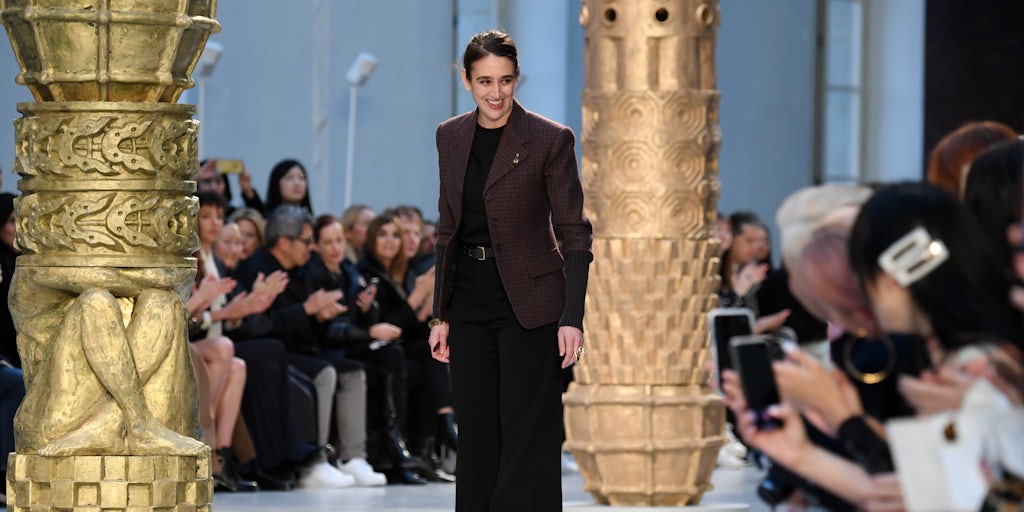Chloé’s Natacha Ramsay-Levi Steps Down | Breaking News
Designer Natacha Ramsay-Levi walks the runway after the Chloe show during Paris Fashion Week in February 2020. Getty Images.
Natacha Ramsay-Levi, creative director of Chloé, is stepping down from her role at the Parisian luxury leather goods and apparel brand. A new creative director will be named later, the Richemont-owned label said in a statement Thursday.
Ramsay-Levi, who worked as a key deputy of Nicolas Ghesquière during his heyday at Balenciaga and during his early seasons at the helm of Louis Vuitton, worked to sharpen Chloé’s image with an edgier and ultimately less commercial take on the house’s ultra-feminine codes. Her runway shows riffed on the brand’s classic hippie-chic and bourgeois silhouettes, adding unconventional styling details and construction, and incorporating a broad palette of references like prints sourced from collaborations with contemporary woman artists. The collections were broadly well received by critics, but ultimately lacking in strong-selling items.
Design choices that often bent toward complication rather than simplification were at times out of step with a market driven by viewing products on tiny smartphone screens rather than in multi-brand boutiques or magazines. Handbag shapes from Chloé’s years under previous designers like Clare Waight Keller and Hannah MacGibbon continued to drive the business, meaning that even Ramsay-Levi’s sharpest looks couldn’t help but be dragged down by an aura of general fatigue at the brand.
The popularity of Chloé it-bags soared during the early and mid-2010s amid demand for a softer and less ostentatious take on luxury. In 2019, Richemont executives said the label had doubled in size in less than five years; Morgan Stanley estimated its revenue that year at €510 million (the group does not break out results for individual brands). More recently, growth in luxury fashion has been dominated by logo-driven mega-brands like Gucci, Chanel, and Vuitton. The need to fuel social media networks with a steady stream of buzzy content has left smaller and more understated houses with a narrow path to profitable and sustainable growth.
“The market is becoming more and more challenging, There are a few brands who are top of mind, and who are able to shape consumers’ preferences. Then you have the others, who struggle,” London-based luxury consultant Mario Ortelli said.
Fashion sales have also been driven by a mix of bold statement items and casual, streetwear-inspired pieces you can wear every day. Much of Chloe’s merchandising doesn’t really fit into either camp and when it came to updating Chloe’s public image, Ramsay-Levi often found her scope for change limited under a CEO and parent company who maintained strong views about what was and was not “Chloé.”
Last year, after over a decade under chief executive Geoffroy de la Bourdonnaye, Chloé tapped former Maison Margiela CEO Riccardo Bellini to take over management of the company.
“A lot of the issues at Chloe have really nothing to do with the designer; they have to do with distribution, marketing, and promotional activity,” said Zuzanna Pusz, UBS luxury analyst.
Owner Richemont has struggled to hold its own in the fashion sector (its main expertise being in luxury watches and jewellery) amid the rising firepower of LVMH and Kering, who dominate luxury fashion’s marketing, supply chain and real estate. The group controlled by South African billionaire Johann Rupert has sold off its Lancel and Shanghai Tang labels and appointed former Givenchy CEO Philippe Fortunato in June to oversee a turnaround at its remaining fashion brands including Chloé, Dunhill and Alaïa.
“Richemont has had incredible success in hard luxury, but the flip side of the coin is that they never found a durable success in fashion,” Ortelli said. “They might eventually reassess whether their continued presence in soft luxury makes sense.”
With recent moves like the appointment of Fortunato to helm their fashion group, a new CEO at YNAP, and a deal to invest in YNAP’s chief rival, Farfetch, “Richemont is trying to shake things up, but it’s not clear what the plan is,” according to Pusz.
Rumours of Ramsay-Levi’s imminent departure grew in intensity during the run-up to her show this fall as several members of her design team left the brand, and the brand posted openings for creative roles.
Her final show in September mixed the physical catwalk with live video projections and original music. It stood out during Paris Fashion Week as one of the brands that best adapted their event to coronavirus restrictions and the reality that most key tastemakers in fashion would be watching online.
“Over the last months of health, social and economic turmoil, I have thought about the changes I want to see in our industry and how to better align them with my own creative, intellectual and emotional values,” Ramsay said in a statement. “It is this reflection that makes me consider my future differently and desire to pursue new opportunities.”

